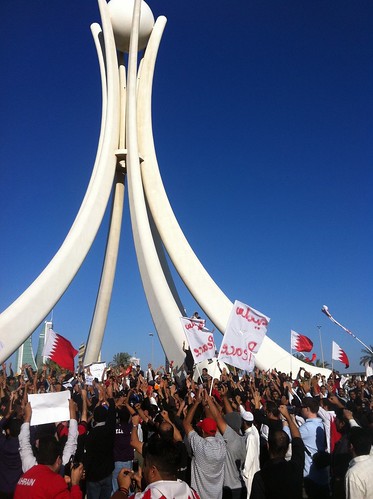Reconsidering U.S. Policy Towards Bahrain
While most of the world’s attention has been focused on the effects of the Arab Spring on larger states like Libya and Egypt, very little attention has been paid to its effects on the smaller countries in the region. Before being crushed by the ruling monarchy, with help from Saudi Arabia, unrest began in the small island kingdom of Bahrain in February. But while the U.S. withdrew its support for Mubarak while his regime was crumbling down and formed part of the NATO intervention that helped topple Gaddafi from power; in the case of Bahrain, the U.S. government hasn’t spoken out against the country’s suppression of protests and has continued to voice support for the monarchy, despite the fact there have been massive human rights abuses in the country. While the crackdown wasn’t as bloody as it was in other states, there were still several deaths and hundreds wounded among the protestors.
The majority of Bahrain’s population is Shia but the ruling Khalifah family is Sunni, as are most of those in the government. The unrest was largely put down by March as the army imposed a curfew and kept protestors off the streets. In the months since, the government has sought to punish those that took part and aided the uprising. Shiites have long been underrepresented in the countries’ politics, and many joined the protests to fight for greater political recognition as well as economic opportunities. In response, Bahraini companies fired hundreds of Shia employees. This has only widened the long-standing divide between Shia and Sunni.
Along with its crackdown against the Shia minority, Doctors Without Borders and Human Rights Watch report that the government has persecuted medical personnel who helped the protesters after the brutal crackdown. There have also been allegations the regime has arrested and even tortured school teachers that participated in the protests.
While President Obama has spoken out against long-time allies like Egypt, and taken the opportunity to criticize governments like Syria that were already unfriendly, why has his administration not spoken out against the Bahraini ruling family?
It has been argued that the Obama Administration views Bahrain as another site in the proxy war between Iran and Saudi Arabia. The Sunni House of Saud has been at odds with the Shia theocracy since the Iranian revolution in 1979, but in recent years, particularly after the fall of Saddam Hussein in Iraq, the so-called “Middle East Cold War” has intensified.
Bahrain is also home to the American Fifth Fleet, which is responsible for the vital strategic area around the Persian Gulf to the Indian Ocean. Some have questioned whether this makes it difficult for the United States to speak out against Bahrain.
If the presence of the Fifth Fleet is the reason for the administration’s reticence, it is a weak one. The United States was quick to abandon Hosni Mubarak’s regime in Egypt despite the fact that Egypt was much more important to American grand strategy than Bahrain. Bahrain is a tiny state that is home to a fleet, while Egypt has been the lynchpin of stability for the past thirty years. Egypt was among America’s closest allies, and it’s peace treaty with Israel has brought relative stability to the region for decades If the White House had given up on Bahrain, it would have been nowhere near as shocking as it was with Mubarak.
There are signs that the administration is beginning to realize the hypocrisy of its condemnation of other Arab states actions, but not in Bahrain. Last week the Defense Department suspended a much-criticized $53m arms sale, pending the results of a commission looking into allegations of human rights abuses in Bahrain. Though as the Bahraini King himself established the commission, activists shouldn’t get their hopes up about what it will say.
[Photo Courtesy of Mahmood Al-Yousif]


Great article indeed. I personally believe the presence of the US 5th Fleet in Bahrain is one of several reasons for US administration to maintain support for the repressive regime there. The US had maintained “alternatives” in Tunisia, Egypt and even Yemen, but apparently non in Bahrain. Therefore the US needs to maintain it’s support to the existing regime.
However, this is likely to backfire on US. Originally Bahraini people had no hostility against US administration but now, hostility is growing and it is likely to witness anti-US activities in the near future.